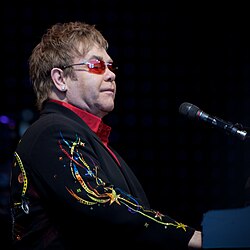| Brit Award for Outstanding Contribution to Music | |
|---|---|
 2024 winner Kylie Minogue | |
| Awarded for | Achievement in excellence in music |
| Country | United Kingdom (UK) |
| Presented by | British Phonographic Industry (BPI) |
| First award | 1977 |
| Currently held by | Kylie Minogue (2024) |
| Most awards | Paul McCartney, John Lennon and Elton John (3) |
| Website | www |
The Brit Award for Outstanding Contribution to Music is the Lifetime Achievement award given by the British Phonographic Industry (BPI), [1] [2] an organisation which represents record companies and artists in the United Kingdom. [3] The accolade is presented at the Brit Awards, an annual celebration of British and international music. [4] The honourees are determined by the Brit Awards voting academy with over one-thousand members, which comprise record labels, publishers, managers, agents, media, and previous winners and nominees. [5]




